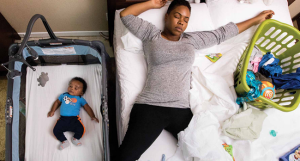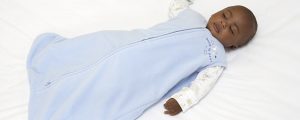
Sudden Unexpected Infant Death (SUID) is the leading cause of death for babies 1 month old until 1 year old in Virginia and nationwide. Almost all of these deaths occur while the baby is sleeping. The studies from these deaths have revealed ways to keep babies safe while they sleep and have shown that these deaths can be prevented. There are things that parents and caregivers can do to protect babies from SUIDs and many things that parents and caregivers should not do. It is important to talk to anyone taking care of your baby about the steps for Safe Sleep.
NEW 2022 American Academy of Pediatrics Safe Sleep Recommendations are Now Available
What Parents and Caregivers Can Do:
- Put your baby back to sleep for every sleep.
- Use a firm, flat, noninclined sleep surface to reduce the risk of suffocation or wedging/entrapment.
- Feeding of human milk is recommended because it is associated with a reduced risk of SIDS.
- It is recommended that infants sleep in the parents’ room, close to the parents’ bed, but on a separate surface designed for infants, ideally for at least the first 6 months.
- Keep soft objects, such as pillows, pillow-like toys, quilts, comforters, mattress toppers, fur-like materials, and loose bedding, such as blankets and nonfitted sheets, away from the infant’s sleep area to reduce the risk of SIDS, suffocation, entrapment/wedging, and strangulation.
- Offering a pacifier at naptime and bedtime is recommended to reduce the risk of SIDS.
- Avoid smoke and nicotine exposure during pregnancy and after birth.
- Avoid alcohol, marijuana, opioids, and illicit drug use during pregnancy and after birth.
- Avoid overheating and head covering in infants.
- It is recommended that pregnant people obtain regular prenatal care.
- It is recommended that infants be immunized in accordance with guidelines from the AAP and CDC.
- Do not use home cardiorespiratory monitors as a strategy to reduce the risk of SIDS.
- Supervised, awake tummy time is recommended to facilitate development and to minimize the risk of flattened skull. Parents are encouraged to place the infant in tummy time while awake and supervised for short periods of time beginning soon after hospital discharge, increasing incrementally to at least 15 to 30 min total daily by age 7 wk.
- It is essential that physicians, nonphysician clinicians, hospital staff, and child care providers endorse and model safe infant sleep guidelines from the beginning of pregnancy.
- It is advised that media and manufacturers follow safe sleep guidelines in their messaging and advertising to promote safe sleep practices as the social norm.
- Avoid the use of commercial devices that are inconsistent with safe sleep recommendations.
- There is no evidence to recommend swaddling as a strategy to reduce the risk of SIDS.

AAP Policy Statement
Baby Box:
Many people are interested in using a Baby Box as a safe spot for a baby to sleep. It is important to remember that the Baby Box is only part of ensuring that your baby has a safe sleep environment. At this time, there is not enough information to know if a Baby Box can help prevent SUIDs.
If you choose to use a Baby Box, it is important to remember all of the steps mentioned above, as well as the following safety tips:
- Never move the Baby Box with your baby in it.
- Always place the Baby Box on a firm, flat surface, such as the floor.
- Avoid placing the Baby Box where people will be walking to avoid tripping and falling
- Ensure pets do not try to crawl in the Baby Box when being used by a baby
- Only use the bedding that comes with the Baby Box to ensure a snug fit.
- Keep the Baby Box away from an open flame.
- Do not let the Baby Box get excessively wet, do not leave out in the rain or place in the bath tub.
- Never use the lid while your baby is inside.
Baby Box University
Baby Box University is a platform established by The Baby Box Co. to provide expecting and new parents with universal access to educational resources and a support system. Baby Box University includes short form videos, articles, an ‘ask an expert’ feature, e-books and more.
*Disclaimer: The views and opinions expressed by The Baby Box Co. are those of the authors and do not necessarily reflect the official policy or position of the Virginia Department of Health.
